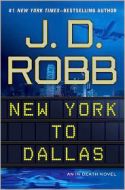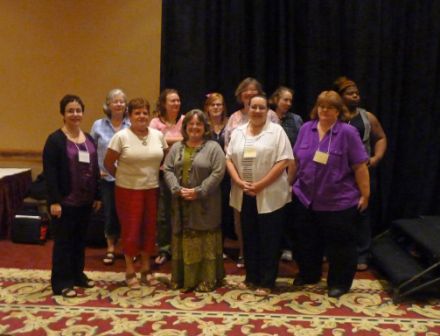
 Scanning the fiction shelves of your local public library, there are a lot of books with labels on the spines for romance, mystery and science fiction. There’s at least one standard brand of those labels where the romance label was a heart, the mystery label was a dagger, and the sci-fi label was a spaceship.
Scanning the fiction shelves of your local public library, there are a lot of books with labels on the spines for romance, mystery and science fiction. There’s at least one standard brand of those labels where the romance label was a heart, the mystery label was a dagger, and the sci-fi label was a spaceship.
This isn’t about the labels. This is about the books.
![]() Back in the Dark Ages (pre-Internet), librarians were the ones who knew when new books were coming out. How did we know? We had some great magazines (yes, magazines) that reviewed books just a few weeks, or maybe even a couple of months, before they came out, so we could order them. Those publications are still familiar names: Library Journal, Publishers Weekly, Booklist, Kirkus, etc. They still publish reviews. And let’s not forget the venerable New York Times Book Review every Sunday and their best seller list.
Back in the Dark Ages (pre-Internet), librarians were the ones who knew when new books were coming out. How did we know? We had some great magazines (yes, magazines) that reviewed books just a few weeks, or maybe even a couple of months, before they came out, so we could order them. Those publications are still familiar names: Library Journal, Publishers Weekly, Booklist, Kirkus, etc. They still publish reviews. And let’s not forget the venerable New York Times Book Review every Sunday and their best seller list.
But the world around them has changed. Everyone knows when books are coming out. Amazon and Barnes & Noble may have books available for pre-order more than six months ahead of publication. But it’s more than that. Reviews are no longer the domain of a select few. Anyone can review a book and post their review on the net. Not just on Amazon and B&N, but also on Goodreads, Shelfari and LibraryThing.
Back to the hearts and daggers and spaceships. Once upon a time, most fiction bestsellers were “just plain” fiction. Today, most fiction bestsellers are part of one or more genres. They are romance, or mystery, or science-fiction, or fantasy, or one of the new genres like urban fantasy or paranormal. Or one of the tried-and-true variations, like horror or thriller or espionage. But fiction sells better today when it is in an easily defined category. Just like cable television has broken down into a zillion niche channels, so has publishing.
Genre readers have also developed their own niches on the net where they publish news and reviews and author interviews, just like the traditional review magazines that libraries have always relied on do. The difference is that many of the genre sites are doing this out of love, and not necessarily for money. For many, this is as much about the fandom as it is about the literature. But they still make terrific review sources for a lot of material that may not be covered by traditional reviewers, particularly not in vast quantity.
 Every public library already knows whether they are going to purchase James Patterson’s next book. Or Nora Roberts’ next, whichever name she writes it under (I’m waiting for New York to Dallas with the proverbial baited breath myself). Librarians just don’t need to see the reviews for certain authors, because it doesn’t matter whether the book is good or bad, it will still be “hot”.
Every public library already knows whether they are going to purchase James Patterson’s next book. Or Nora Roberts’ next, whichever name she writes it under (I’m waiting for New York to Dallas with the proverbial baited breath myself). Librarians just don’t need to see the reviews for certain authors, because it doesn’t matter whether the book is good or bad, it will still be “hot”.
 But monitoring a group of genre fiction blogs and websites, even if it is a moving target, can bring in a lot of really great material, including ebooks, for your patrons, and can help separate the wheat from the proverbial dusty chaff. Smart Bitches, Trashy Books and Fiction Vixen both review romance, and lots of it. This is a great thing, since there is an awful lot of romance published, and nowhere near enough of it gets reviewed anywhere except online, particularly the ebook-only titles. All Things Urban Fantasy, Para Your Normal and Galaxy Express (Science Fiction Romance) cover subgenres that aren’t necessarily even thought of by more traditional reviewing sources.
But monitoring a group of genre fiction blogs and websites, even if it is a moving target, can bring in a lot of really great material, including ebooks, for your patrons, and can help separate the wheat from the proverbial dusty chaff. Smart Bitches, Trashy Books and Fiction Vixen both review romance, and lots of it. This is a great thing, since there is an awful lot of romance published, and nowhere near enough of it gets reviewed anywhere except online, particularly the ebook-only titles. All Things Urban Fantasy, Para Your Normal and Galaxy Express (Science Fiction Romance) cover subgenres that aren’t necessarily even thought of by more traditional reviewing sources.
 Locus Magazine and the SciFiGuy both review science fiction and fantasy. The Rap Sheet and Criminal Element cover (or uncover) Mystery. And many of these sites have that wonderful feature, a blog roll. Veritable treasure troves of sites in the same bailiwick.
Locus Magazine and the SciFiGuy both review science fiction and fantasy. The Rap Sheet and Criminal Element cover (or uncover) Mystery. And many of these sites have that wonderful feature, a blog roll. Veritable treasure troves of sites in the same bailiwick.
As both selection resources for collection development and readers’ advisory resources for patron services, these sites are fantastic. They can answer questions like “what is the authors’ preferred reading order for the Liaden series vs. the publication order?” and “If I have patrons who like Sookie Stackhouse but not Anita Blake, what else should I buy?” There’s also the ever popular question of where to go for clues on what to purchase to fill in the ebook selection on OverDrive. Those are the most popular genres, and most of them are not reviewed. Checking out the purchaser reviews on Amazon, or going to a specialty site like Fiction Vixen may help you decide.
And it’s fun.




